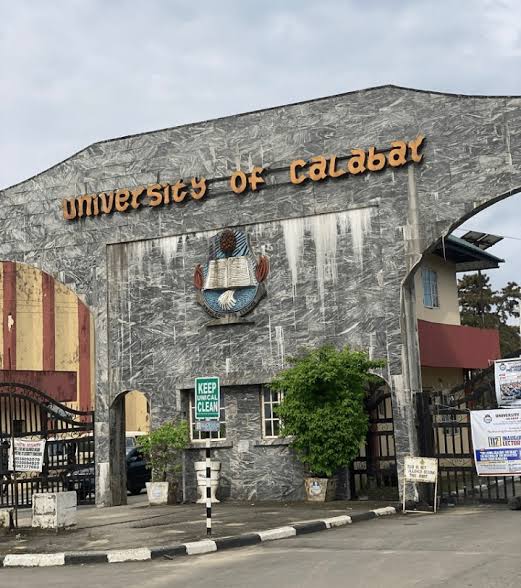The University of Calabar (UNICAL) has found itself at the center of a major academic storm following revelations of widespread admission irregularities that have left dozens of students heartbroken and confused. The controversy, which has now been dubbed the UNICAL quota crisis, has led to the forced withdrawal of several students from key medical programmes, sparking outrage and emotional appeals from those affected.
According to multiple reports from within the institution, the crisis primarily affects students in the Faculty of Basic Medical Sciences — particularly those admitted into Medicine and Surgery, Dentistry, and Nursing Science. The university management reportedly began a stringent enforcement of professional admission quotas and academic standards, insisting that any student found to have been admitted irregularly, or without proper clearance, must withdraw or change their course of study.
Background to the Quota Crisis
The issue stems from what university insiders describe as an “over-admission problem” — a situation in which more students were admitted than allowed under professional council regulations. These regulatory bodies, such as the Medical and Dental Council of Nigeria (MDCN) and the Nursing and Midwifery Council of Nigeria (NMCN), set strict quotas for the number of students that each accredited university can admit into their medical-related programmes annually.
In the case of UNICAL, it is alleged that the institution exceeded its approved quota during recent admission cycles. When accreditation and inspection teams from these councils raised concerns, the university was left with no option but to enforce compliance — even if it meant sacrificing already admitted students.
Students Caught in the Middle
Many of the affected students have described their ordeal as “heartbreaking” and “unjust,” claiming that they were admitted in good faith through the official university portal, only to be later told their admission was invalid or above quota.
Some students who had already completed their first or second year in the College of Medical Sciences were reportedly asked to withdraw, despite maintaining commendable academic records. Affected departments include Medicine and Surgery, Dentistry, and Nursing Science, where the number of registered students far exceeded the official limits.
Students were allegedly called in batches and informed that their admission was being withdrawn or that they would have to transfer to related courses such as Human Anatomy, Human Physiology, Microbiology, or Medical Laboratory Science. For many, this development shattered years of dreams and financial investment.
One affected student lamented, “We did not give ourselves admission. We followed all the normal procedures, wrote JAMB, and were admitted officially. Now, after paying school fees and passing our exams, they say we are not qualified to continue. This is very unfair.”
New Academic Rules Introduced
As part of measures to align with regulatory requirements and sanitize its medical programmes, the University of Calabar has reportedly introduced strict academic conditions for students already in the affected departments.
Among the new rules are:
- Minimum CGPA of 3.5: All students in Medicine and Surgery must maintain a minimum Cumulative Grade Point Average (CGPA) of 3.5 to remain in the programme.
- No Carryovers or F Grades: Any student who fails a course (earns an “F” grade) will be automatically disqualified and transferred to a different programme.
- Single O’Level Sitting Requirement: Students who combined results from different O’Level exams (such as WAEC and NECO) are now deemed ineligible for Medicine, Dentistry, or Nursing.
- Unauthorized Course Changes Prohibited: Students who changed courses without official departmental or faculty approval are being asked to withdraw immediately.
While the university management argues that these rules are in line with professional standards and are necessary to preserve accreditation, students and parents have described the move as retroactive punishment.
Management’s Justification
The university administration has maintained that it is acting within the boundaries of law and academic integrity. According to senior officials, UNICAL risks losing accreditation for some of its prestigious medical programmes if it continues to exceed approved quotas or retain students who were improperly admitted.
One senior staff member, speaking anonymously, noted that the regulatory councils had issued repeated warnings to the institution. He explained that the university had no choice but to comply fully to avoid sanctions that could affect future admissions and the professional recognition of its graduates.
“We understand the emotional pain this causes, but we must protect the integrity of our degrees. The councils are strict about quotas, and if we fail to comply, our students’ certificates may not be recognized nationwide,” the official stated.
Widespread Reactions from Students and Parents
The situation has provoked a wave of reactions from students, parents, and education stakeholders across Nigeria. Many have accused the institution of poor planning and administrative negligence, insisting that students should not bear the consequences of errors made by admission officials.
Social media platforms have also been flooded with emotional posts and videos showing affected students crying or pleading for reconsideration. Parents’ groups have reportedly begun reaching out to the university’s Vice-Chancellor and the Federal Ministry of Education, seeking urgent intervention.
Education activists argue that the quota enforcement, while legally justifiable, exposes a deeper problem within Nigeria’s higher education system — where universities often over-admit students beyond what facilities and regulators can accommodate.
Possible Legal and Policy Implications
The ongoing quota crisis could lead to legal action, as some students are reportedly preparing to challenge the university’s decision in court. Legal experts have pointed out that unless the students were formally informed of conditional admission or quota limitations before matriculation, UNICAL could face claims of breach of contract and administrative injustice.
Policy analysts also believe this incident may push the federal government to review the current quota system for medical programmes in Nigeria. Many universities face the same issue of limited admission slots despite overwhelming demand from qualified candidates.
Broader Implications for the Nigerian Education System
The University of Calabar’s situation underscores the broader challenges in Nigeria’s tertiary education system, especially in high-demand courses like Medicine and Nursing. The imbalance between student demand, institutional capacity, and professional regulation continues to generate crises that affect thousands of lives every academic year.
Experts say that unless universities improve transparency in admissions and the federal government expands infrastructure and quotas, similar situations may keep recurring across campuses nationwide.
Conclusion
The UNICAL quota crisis serves as a painful reminder of the systemic cracks within Nigeria’s education framework. While the university’s actions may be aimed at preserving accreditation and ensuring quality control, the human cost — in terms of students’ dreams, emotions, and financial investments — cannot be ignored.
As affected students continue to seek justice and clarity, stakeholders hope that the University of Calabar, regulatory bodies, and the Federal Ministry of Education will work together to find a fair and compassionate resolution that balances compliance with empathy.



